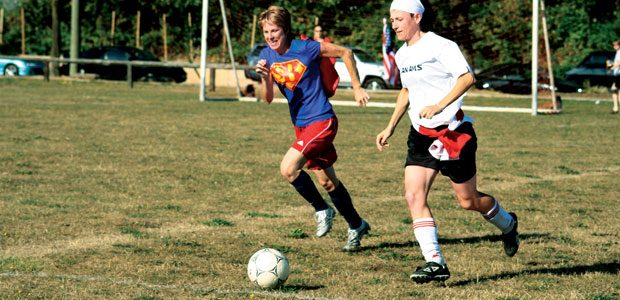Advertisement
Beat the Blues – Together
Winter days, with their ubiquitous leaden skies, can seem unendurably long. Blizzards and algid rains mean that we Canadians will be spending much time indoors for the next several months, a scenario that–for this sun-worshipping scribbler–often brings about a feeling of disconnection with the outside world. This winter I am going to war with Jack … Continued

Winter days, with their ubiquitous leaden skies, can seem unendurably long. Blizzards and algid rains mean that we Canadians will be spending much time indoors for the next several months, a scenario that–for this sun-worshipping scribbler–often brings about a feeling of disconnection with the outside world.
This winter I am going to war with Jack Frost by participating in an activity that will not only improve my sagging mental state but will also offer me a host of other benefits–team sports.
The Secret to Happiness
According to psychologist Aimee Kimball, director of mental training at the University of Pittsburgh Center for Sports Medicine, humans need three elements to be truly happy:
confidence, autonomy (independence or freedom), and relatedness. “Participating in group physical activities like dancing, hockey and volleyball can have the biggest impact on the relatedness part of this equation,” says Kimball. Feeling as though you have a connection or kinship with others is what relatedness is all about. “So if you hibernate during winter’s big chill or only participate in individual activities, you can come up short in this component of human happiness,” she explains.
Involving yourself in a team sport is a simple way to give you this interrelation with others. “I am able to extract many positive things from a team environment,” says Stacey Dales, a Canadian-born star with the Chicago Sky of the Women’s National Basketball Association and an Olympian for Team Canada. Stacey explains that the positive feeling of working toward a common goal and the support she obtains from those around her are two main reasons why she has always participated in group physical fitness. “Playing sports gives you purpose, extra challenges and a real opportunity for emotional highs.”
A Remedy for SAD
These emotional highs can be all the more important to combat those unwelcome winter blues during the gloomy months between autumn and spring. The connection between human moods and the seasons is well documented. Seasonal affective disorder (SAD) is a type of depressive condition that affects people–even seemingly robust, healthy individuals–at a particular time of year, usually when the appearance of the sun is just a cruel rumour. It’s thought that SAD affects 2 to 4 percent of the population, with symptoms ranging from energy loss and social withdrawal to an inability to keep hands out of the cookie jar. But you don’t have to be diagnosed with SAD to combat emotional flatness during winter’s reign. Long after the last fall foliage has found a new home on the ground, signing up for a multiperson physical activity can be just the boost you need to stay fit and chipper.
Kimball believes that participating in team sports helps change your focus. “When you are sitting at home and not connecting with others, you allow your mind to focus on the negative aspects of life. Being active with your peers gives you something positive to focus on.” It’s no wonder that regular exercise is a common prescription for SAD. “I use my teammates to ground me emotionally during the bad times,” adds Dales. Having an outlet to vent about a nasty boss–or about those few extra pounds that you can’t get rid of–can be very important psychologically. “Your fellow participants can give you the emotional outlet that’s so very much needed,” Kimball says.
A Way to Stay Confident and Fit
Not to be overlooked is the role team sports plays in building self-confidence. Getting a high-five from a teammate, hearing a timely “you’re doing great,” netting the winning goal, or reaching your athletic aspirations can all boost your self-esteem. The beneficial aspects associated with group activities can lay the foundation for achieving further life accomplishments. “The confidence achieved through sport can spill over into the workplace and daily life,” confirms Dales.
In addition to all this, spending a few nights a week playing with your friends on the court or on the ice is a fun way to build a better body. “Because of a relatedness to others, you have an increased chance of sticking with an exercise program if you make it a group activity,” Kimball explains. Those around you can encourage you to work harder, to try new activities, and to show up at the gym when all you want to do is lie on the couch and watch your favourite TV show.
Getting Started
Don’t let your body lie dormant this winter. “Start with something you are interested in and try and get a couple friends to join you,” recommends Dales. From there, why not branch out? Here are some suggestions on how you can get involved in group sports in your neck of the woods.
- Local newspapers usually have listings of sport leagues looking for participants at a variety of skill levels. Almost every city has an intramural program offering a wide variety of sporting activities.
- Community centres have a wealth of programs available and are usually at the right price–free!
- Fitness centres are increasingly offering a wide range of team-oriented endeavours, such as small-group personal training.
- If you fancy the odd run, consider joining one of the many running groups that are sprouting up all over the country. Most continue their group jaunts during the winter.
- Dancing, although not technically a team sport, provides a great opportunity to interact with others in a relaxed atmosphere and is an enjoyable way to burn off a few calories. A simple Google search can steer you to a dance hall in your neighbourhood.





